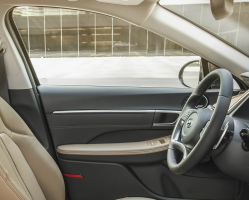
— Alleged Hyundai and Kia power window problems have caused a class action lawsuit that includes Hyundai and Kia vehicles built from July 2008 to the present and sold to California residents.
In addition, the Hyundai and Kia vehicles must be if equipped with power window stop-and-reverse systems.
Power window stop-and-reverse systems help protect fingers, hands, necks and objects from getting caught in the window that is moving upward.
The U.S. federal government has safety standards that must be met concerning power windows, but the two plaintiffs who filed the lawsuit claim millions of Hyundai and Kia vehicles don't meet those standards.
California Plaintiff Zachary McCready owns a 2019 Hyundai Kona and alleges his vehicle has diminished value because the vehicle is defective due to the power windows.
California plaintiff Brianne Schumpert owns a 2018 Kia Sorento also allegedly worth less than it should be because of the power windows.
The lawsuit doesn't make claims that either plaintiff suffered injuries or problems with the power window stop-and-reverse systems.
Federal safety standards say a power window should reverse if the window encounters a foreign object at "100 newtons" of pressure (22.5 pounds of force). But the plaintiffs claim the Hyundai and Kia power windows fail to stop and reverse at 100 newtons of pressure.
The plaintiffs don't explain how they discovered the power windows don't reverse at 100 newtons, but the lawsuit uses a raw carrot as an example of the alleged problem.
According to the lawsuit, a raw carrot requires 200 newtons of pressure to slice through the carrot. However, the class action alleges Hyundai and Kia power windows "regularly slice carrots in half, exerting more than twice the amount of pressure allowed by federal law."
According to the class action, Hyundai and Kia should return to customers the purchase prices for the vehicles.
The Hyundai and Kia power window lawsuit was filed in the Orange County California Superior Court - McCready, et al., vs. Hyundai Motor America, et al.
The plaintiffs are represented by MLG, APLC.




